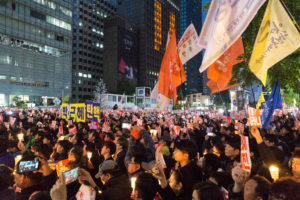South Korea Removes President in Historic Move
 The South Korean Constitutional Court upheld the impeachment of President Park Geun-hye on March 10, making her the nation’s first democratically elected leader to be forced out of office.
The South Korean Constitutional Court upheld the impeachment of President Park Geun-hye on March 10, making her the nation’s first democratically elected leader to be forced out of office.
Park’s removal concludes months of social unrest during which hundreds of thousands of South Koreans filled the streets to protest a corruption scandal that has shaken the top ranks of business, government, and academia. It also marks the fall of South Korea’s first female president and the daughter of the former authoritarian president Park Chung-hee, whose heritage turned his daughter into a conservative icon.
The court’s acting Chief Justice, Lee Jung-mi, stated that Park had violated the constitution and the law throughout her term. Park used her influence as president to funnel funds from businesses into foundations set up by longtime acquaintance Choi Soon-sil. The former head of state also leaked classified government documents to Choi, allowing her to influence critical decisions within state affairs. The eight-person court cited these as the primary motives behind its decision to uphold the parliament’s December 9 impeachment vote.
"The removal of the claimee from office is overwhelmingly to the benefit of the protection of the constitution. ... We remove President Park Geun-hye from office," said Lee, explaining the rationale behind the court’s verdict.
No longer holding immunity as president, Park can now face criminal charges for extortion, bribery, abuse of power, and other allegations in relation to her collusion with Choi. Hankyoreh reported that South Korean prosecutors plan to summon Park on March 21 as a suspect for the series of allegations. Park's lawyer claims that Park will faithfully undergo the questioning, though Park has denied all allegations and expressed de facto resistance to the court’s ruling.
"Although it will take time, I believe the truth will certainly come out," Park said as she arrived at her home after leaving the presidential Blue House and greeting her supporters.
The turmoil over the past few months surrounding the impeachment revealed sharp divisions within the country’s population. For instance, candlelight protests in favor of Park’s impeachment were countered by Park’s supporters, who conducted their own demonstrations by raising the Korean flag as a symbol of their support for Park.
After the court delivered its verdict, a group of Park supporters rallying near the courthouse tried to break through police lines and storm the court. When blocked by police, protesters attacked the officers, throwing water bottles and pieces of the sidewalk pavement. Three pro-Park demonstrators died in the confusion, according to Yonhap News.
Park’s impeachment may signal the end of an era in the young history of Korean democracy, whose first democratically elected president came to power only three decades ago. She is the remnant of a generation that achieved remarkable economic development but discarded democratic ideals. Consequently, Foreign Policy reported that her presidency brought back many of the practices her father employed when he unilaterally ruled Korea in the 1970’s, including censorship of the press and utilizing the National Intelligence Service for political purpose. Hankook Ilbo reported that she also allegedly blacklisted artists and writers who criticized the regime.
Shortly after the ruling, Acting President Hwang Kyo-ahn announced that an election will be held on May 9 to select a new president. Until then, Hwang will continue to serve as the acting head of state by managing state affairs and preparing for the election.
Moon Jae-in, a liberal opposition leader who lost the 2012 presidential election to Park, is the favorite in the next election. The polling agency RealMeter showed that he is followed by fellow liberals Ahn Hee-jung and Lee Jae-myung within his own party.
Former United Nations Secretary-General Ban Ki-moon’s decision to drop out of the race disappointed many in Park’s conservative Liberty Korea Party. Hwang arose as an alternative, but he announced on March 15 that he would not run. The current leading conservative candidate according to RealMeter is former lawmaker and current Governor of South Gyeongsang Province Hong Jun-pyo, who is behind all three potential liberal candidates. Regardless of political affiliation, the incoming leadership faces the important task of uniting a polarized nation and sustaining a legacy of democracy shaped by the people.
